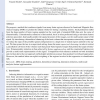Free Online Productivity Tools
i2Speak
i2Symbol
i2OCR
iTex2Img
iWeb2Print
iWeb2Shot
i2Type
iPdf2Split
iPdf2Merge
i2Bopomofo
i2Arabic
i2Style
i2Image
i2PDF
iLatex2Rtf
Sci2ools
CORR
2011
Springer
2011
Springer
A supervised clustering approach for fMRI-based inference of brain states
We propose a method that combines signals from many brain regions observed in functional Magnetic Resonance Imaging (fMRI) to predict the subject’s behavior during a scanning session. Such predictions suffer from the huge number of brain regions sampled on the voxel grid of standard fMRI data sets: the curse of dimensionality. Dimensionality reduction is thus needed, but it is often performed using a univariate feature selection procedure, that handles neither the spatial structure of the images, nor the multivariate nature of the signal. By introducing a hierarchical clustering of the brain volume that incorporates connectivity constraints, we reduce the span of the possible spatial configurations to a single tree of nested regions tailored to the signal. We then prune the tree in a supervised setting, hence the name supervised clustering, in order to extract a parcellation (division of the volume) such that parcel-based signal averages best predict the target information. Dimensi...
Brain Regions | CORR 2011 | Dimensionality Reduction | Education | Functional Magnetic Resonance Imaging |
| Added | 13 May 2011 |
| Updated | 13 May 2011 |
| Type | Journal |
| Year | 2011 |
| Where | CORR |
| Authors | Vincent Michel, Alexandre Gramfort, Gaël Varoquaux, Evelyn Eger, Christine Keribin, Bertrand Thirion |
Comments (0)

